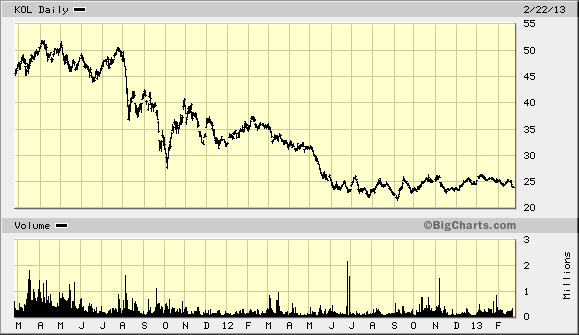As the fracking boom has generated massive new interest in domestic oil and gas production, coal has become the red-headed stepchild of the energy industry. Soaring new supplies of natural gas have led to a glut that has kept prices depressed for the past several years, but they’ve also pushed down the prices of energy competitors such as coal. Coal prices collapsed during the 2008 meltdown and are still less than half their old highs.
In an age of climate change awareness, coal is about as politically incorrect as you can get. By Energy Information Administration estimates, coal use produces 77% more carbon dioxide than natural gas for a comparable amount of energy. This is a tough sell in an era when we have abundant alternatives. Not surprisingly, coal consumption fell in the United States in 2012 and is expected to rise only modestly this year and next.
So what are we to make of this? In the age of cheap gas and environmental awareness, is coal as an industry in terminal decline?
Absolutely not. Though we may associate coal with mines in America’s Appalachian region, China is the most significant player in the coal market. China consumes nearly as much coal as the entire rest of the world combined, and despite being a major producer of coal for its own domestic use, China also imports massive quantities for use in the production of both energy and steel. In 2012, a year that saw anemic economic growth, China’s coal imports rose by nearly 60%.
Demand for coal among other emerging markets, such as India, is also on the rise. India is expected to overtake the United States as the second-largest consumer of coal by 2017, and its coal imports are expected to grow by well over 50% between now and then. And even in the developed world, coal consumption is on the rise in several countries, most notably the manufacturing juggernauts Germany and Japan. Worries of global warming have taken a backseat to fears of nuclear meltdowns after the Fukushima incident.
Coal’s pricing is also not as weak as the action of the past five years might suggest. Looking at the longer term picture we see a very different story.
Aside from the 2007/2008 price spike, which saw the thermal coal CAPP price soar from $40 per ton to nearly $140 per ton in a matter of months, the price of coal has been relatively stable by energy standards. Prices have spent most of the past 12 years in a fairly tight band of $40-$80 per ton.
So, is coal a viable investment theme? Judging by the performance of the Market Vectors Coal ETF (KOL), you might have second thoughts. Coal stocks have fallen by half over the past two years and have barely budged at all since June of last year. Yet coal stocks as a group trade for just 14 times rather depressed earnings, and the worst is likely over for coal pricing, as natural gas prices have shown some sign of stabilizing.
If you are pondering an investment in coal, Peabody Energy (BTU) is not a bad option. Peabody has enormous coal mining operations in Australia, which now account for the majority of the company’s profits. The Australian mines are well placed to serve China’s insatiable need for coal, which should only increase now that China is showing signs of life again.
Peabody is reasonably priced at 11 times expected earnings and just 0.7 times sales. This is not rock-bottom pricing by energy stock standards, but it is by no means expensive.
Longer term, the company’s biggest risk is a true hard landing in China, not the 7.5% growth we saw in 2012 that (only in China) counts as “slow growth.”
By “hard landing,” I mean a prolonged economic contraction not unlike that experienced by Japan starting in the early 1990s. I expect that hard landing to come before the end of this decade due to the country’s aging demographics and its apparent overbuilding of infrastructure in most of the higher-income coastal regions. But in the meantime, a short-to-medium-term rebound in China should bode well for coal prices and for coal stocks such as Peabody.
Disclosures: Sizemore Capital has no position in any security mentioned at time of writing. This article first appeared on MarketWatch.
- English (UK)
- English (India)
- English (Canada)
- English (Australia)
- English (South Africa)
- English (Philippines)
- English (Nigeria)
- Deutsch
- Español (España)
- Español (México)
- Français
- Italiano
- Nederlands
- Português (Portugal)
- Polski
- Português (Brasil)
- Русский
- Türkçe
- العربية
- Ελληνικά
- Svenska
- Suomi
- עברית
- 日本語
- 한국어
- 简体中文
- 繁體中文
- Bahasa Indonesia
- Bahasa Melayu
- ไทย
- Tiếng Việt
- हिंदी
Is The Worst Over For Coal?
Latest comments
Loading next article…
Install Our App
Risk Disclosure: Trading in financial instruments and/or cryptocurrencies involves high risks including the risk of losing some, or all, of your investment amount, and may not be suitable for all investors. Prices of cryptocurrencies are extremely volatile and may be affected by external factors such as financial, regulatory or political events. Trading on margin increases the financial risks.
Before deciding to trade in financial instrument or cryptocurrencies you should be fully informed of the risks and costs associated with trading the financial markets, carefully consider your investment objectives, level of experience, and risk appetite, and seek professional advice where needed.
Fusion Media would like to remind you that the data contained in this website is not necessarily real-time nor accurate. The data and prices on the website are not necessarily provided by any market or exchange, but may be provided by market makers, and so prices may not be accurate and may differ from the actual price at any given market, meaning prices are indicative and not appropriate for trading purposes. Fusion Media and any provider of the data contained in this website will not accept liability for any loss or damage as a result of your trading, or your reliance on the information contained within this website.
It is prohibited to use, store, reproduce, display, modify, transmit or distribute the data contained in this website without the explicit prior written permission of Fusion Media and/or the data provider. All intellectual property rights are reserved by the providers and/or the exchange providing the data contained in this website.
Fusion Media may be compensated by the advertisers that appear on the website, based on your interaction with the advertisements or advertisers.
Before deciding to trade in financial instrument or cryptocurrencies you should be fully informed of the risks and costs associated with trading the financial markets, carefully consider your investment objectives, level of experience, and risk appetite, and seek professional advice where needed.
Fusion Media would like to remind you that the data contained in this website is not necessarily real-time nor accurate. The data and prices on the website are not necessarily provided by any market or exchange, but may be provided by market makers, and so prices may not be accurate and may differ from the actual price at any given market, meaning prices are indicative and not appropriate for trading purposes. Fusion Media and any provider of the data contained in this website will not accept liability for any loss or damage as a result of your trading, or your reliance on the information contained within this website.
It is prohibited to use, store, reproduce, display, modify, transmit or distribute the data contained in this website without the explicit prior written permission of Fusion Media and/or the data provider. All intellectual property rights are reserved by the providers and/or the exchange providing the data contained in this website.
Fusion Media may be compensated by the advertisers that appear on the website, based on your interaction with the advertisements or advertisers.
© 2007-2025 - Fusion Media Limited. All Rights Reserved.
